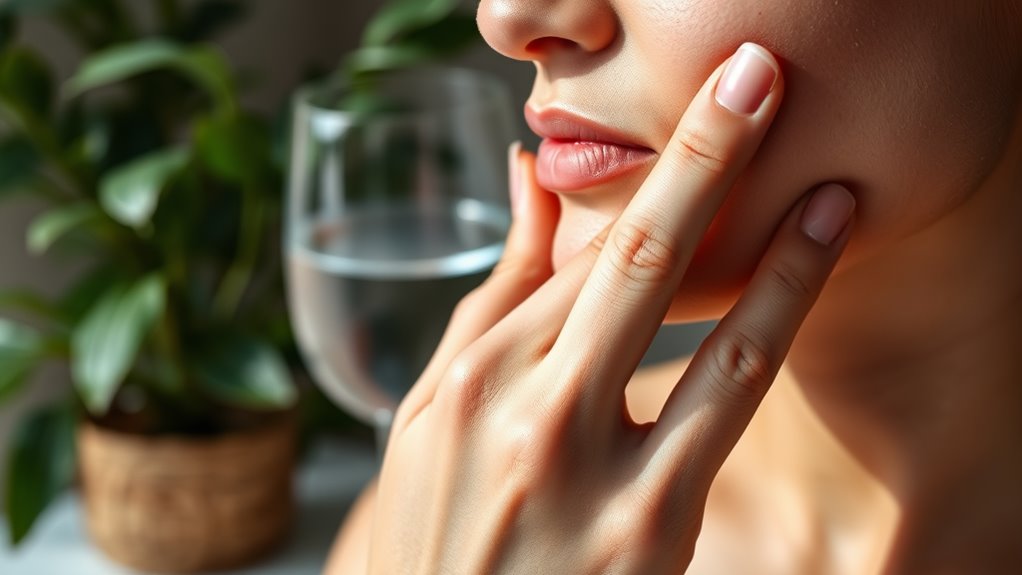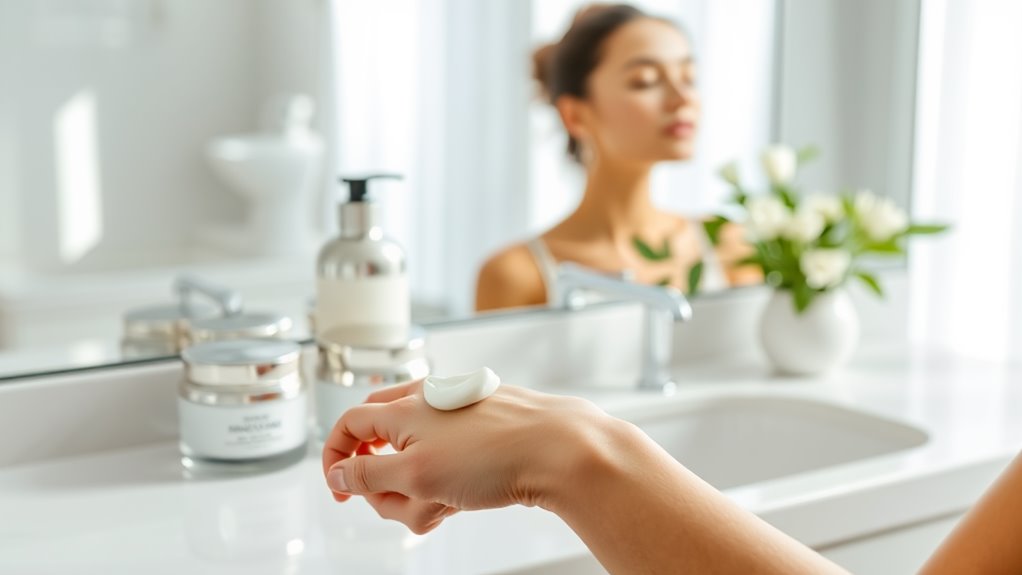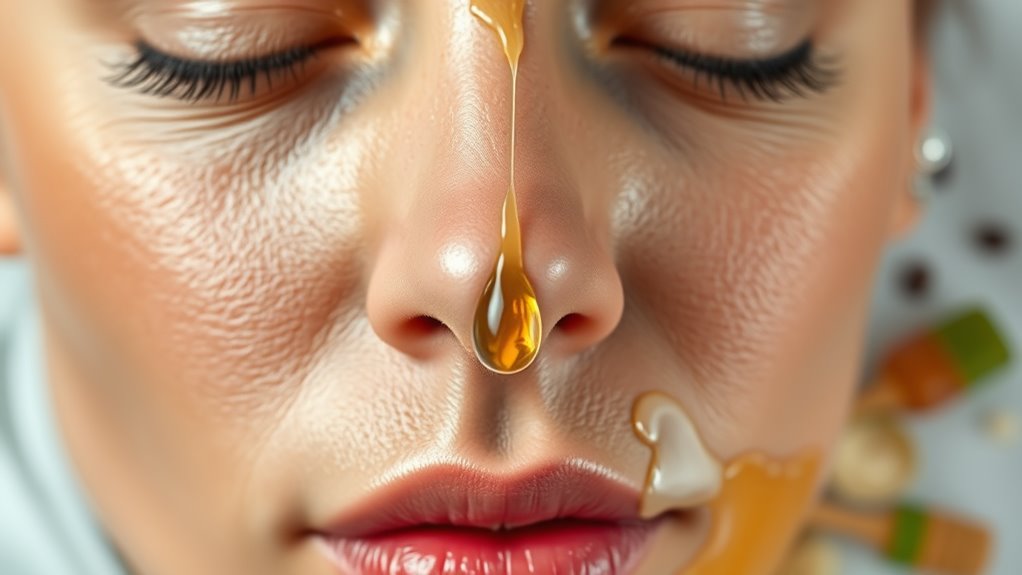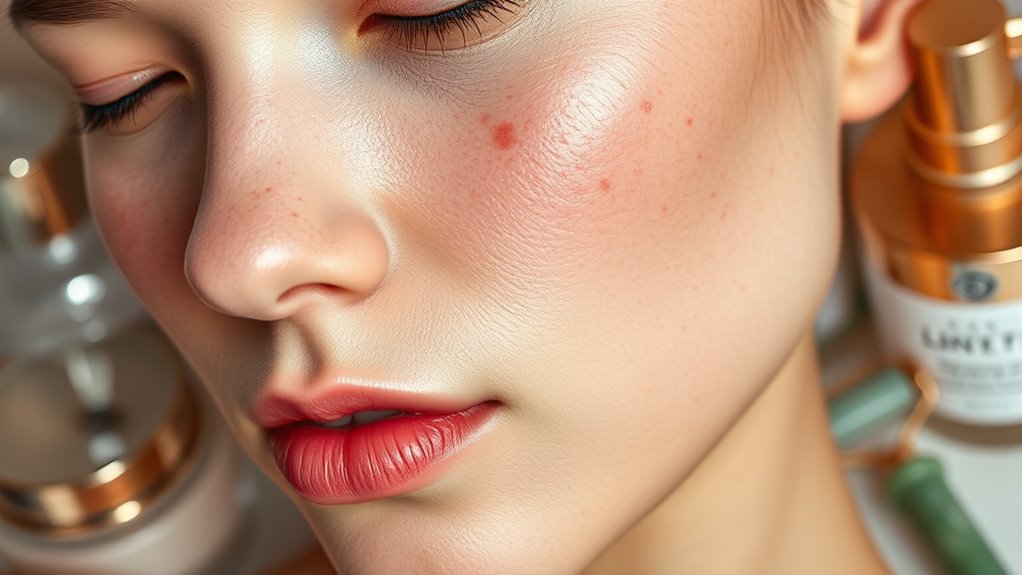The Real Reason Your Skin Feels Dry All Day – And How to Hydrate It
Your skin feels dry all day due to a mix of internal and external factors. Insufficient hydration, harsh soaps, and environmental conditions like low humidity can strip moisture. Additionally, your diet plays a crucial role; foods rich in omega-3s and vitamins can improve skin health. To hydrate effectively, use a tailored moisturizer, maintain a consistent skincare routine, and consider a humidifier for dry environments. Discover more insights on achieving lasting hydration and addressing dryness effectively.
Key Takeaways
- Dry skin often results from internal factors like inadequate hydration, essential fatty acid deficiency, and certain medical conditions affecting moisture levels.
- Environmental factors such as low humidity, cold weather, and UV exposure can exacerbate moisture loss from the skin.
- Using harsh soaps and hot water can strip natural oils, leading to increased dryness and irritation.
- Incorporate a consistent skincare routine with a gentle cleanser, hydrating serum, and rich moisturizer to lock in moisture.
- Maintain proper hydration by drinking enough water, consuming hydrating foods, and avoiding alcohol and smoking for healthier skin.
Understanding Skin Hydration
Understanding skin hydration is crucial for maintaining healthy, radiant skin. Proper hydration involves balancing water content within your skin cells, which supports elasticity and barrier function.
To fix dry skin issues, you need to focus on both internal and external factors. Internally, ensure you’re consuming adequate water, electrolytes, and essential fatty acids, which contribute to skin moisture retention.
Externally, select products rich in humectants like hyaluronic acid and glycerin that attract water, while occlusives like shea butter seal in moisture. Regularly exfoliating helps remove dead skin cells, allowing better product absorption. Additionally, avoiding common mistakes in your skincare routine can significantly improve your skin’s hydration levels.
Common Causes of Dry Skin
While various factors can contribute to dry skin, some of the most common causes include environmental conditions, lifestyle choices, and underlying health issues.
If you frequently expose your skin to harsh soaps or hot water, you’re stripping away natural oils, leading to dryness. Additionally, inadequate hydration from a lack of water intake can exacerbate skin issues.
Lifestyle habits like smoking and excessive alcohol consumption also dehydrate your skin. Furthermore, certain medical conditions, such as eczema, psoriasis, or hypothyroidism, can significantly impact skin moisture levels. Environmental factors like low humidity can also play a crucial role in exacerbating dryness.
Medications like diuretics may worsen dryness as well. Recognizing these causes is essential for effectively addressing your skin’s hydration needs and implementing targeted solutions.
Environmental Factors Affecting Skin Moisture
Environmental factors play a crucial role in your skin’s moisture levels, often dictating how well your skin retains hydration. Understanding these variables can empower you to take proactive measures.
Consider the following factors that may be affecting your skin’s moisture:
-
Humidity Levels: Low humidity can lead to increased evaporation of moisture from your skin.
-
Temperature: Cold weather can constrict blood vessels, reducing moisture delivery.
-
Sun Exposure: UV rays can damage your skin barrier, leading to moisture loss.
-
Pollution: Environmental pollutants can disrupt your skin’s barrier function.
-
Indoor Heating/Cooling: Central heating and air conditioning can dry out the air, impacting skin hydration.
Incorporating winter skincare swaps for hydration is essential for maintaining optimal skin health and moisture retention.
The Role of Diet in Skin Hydration
Your diet significantly influences your skin’s hydration levels, as the nutrients you consume directly impact your body’s ability to maintain moisture.
Essential fatty acids, particularly omega-3s, promote skin barrier function, reducing moisture loss. Hydrating foods rich in antioxidants, like fruits and vegetables, help combat oxidative stress, which can impair skin hydration.
Vitamins A, C, and E are crucial for skin repair and hydration; incorporate sources such as carrots, citrus fruits, and nuts.
Moreover, adequate water intake is vital, as dehydration can lead to dry, flaky skin. Additionally, avoiding acne-triggering foods can help maintain overall skin health and hydration.
Hydration Myths Debunked
Many people believe common myths about skin hydration that can mislead their skincare routines. Understanding the facts can empower you to achieve optimal hydration. Here are five myths debunked:
-
Drinking water alone hydrates skin: Topical products are essential for skin barrier support.
-
Oily skin doesn’t need moisturizer: All skin types require hydration, even oily ones.
-
You can’t over-hydrate your skin: Excessive hydration can disrupt your skin’s natural barrier.
-
Natural oils are always better: Some oils can clog pores and irritate sensitive skin.
-
Hot showers are beneficial for hydration: They can strip natural oils, leading to dryness. Additionally, topical products are crucial for maintaining moisture levels and supporting your skin’s barrier function.
Importance of Moisturizers
Moisturizers play a crucial role in maintaining skin hydration and barrier function.
Understanding the different types of moisturizers, along with key ingredients to look for, can significantly enhance your skincare routine.
Moreover, applying these products correctly ensures you maximize their effectiveness for optimal skin health.
Types of Moisturizers
Choosing the right type of moisturizer is essential for effectively hydrating dry skin. Various types serve distinct purposes, and understanding them can significantly enhance your skincare routine.
Here are the main categories:
-
Humectants: Attract moisture from the air into the skin.
-
Emollients: Smooth and soften the skin’s surface by filling in gaps between skin cells.
-
Occlusives: Create a barrier to prevent moisture loss, ideal for extremely dry skin.
-
Creams: Thicker formulations suitable for night use or harsh weather conditions.
-
Lotions: Lighter, easily absorbed options for daytime application.
Selecting the appropriate moisturizer ensures optimal hydration and promotes skin health, allowing you to combat dryness effectively.
Prioritize your skin’s specific needs to achieve lasting moisture retention.
Key Ingredients to Look For
When selecting a moisturizer, it’s vital to consider the key ingredients that can significantly enhance its hydrating properties.
Look for humectants like glycerin and hyaluronic acid, which attract water to the skin, providing immediate hydration.
Emollients such as shea butter and squalane help to soften and smooth the skin’s surface, creating a barrier that locks in moisture.
Additionally, occlusives like petrolatum and dimethicone form a protective layer to prevent water loss.
Antioxidants, including vitamin E and green tea extract, not only hydrate but also combat oxidative stress, promoting overall skin health.
Application Techniques for Effectiveness
Effective application techniques can greatly enhance the benefits of moisturizers for dry skin. To maximize hydration, consider these essential practices:
-
Apply on Damp Skin: Lock in moisture by applying your moisturizer immediately after cleansing.
-
Use Gentle Patting: Instead of rubbing, use gentle patting motions to help the product absorb better.
-
Layer Strategically: For enhanced effectiveness, layer products from thinnest to thickest consistency.
-
Focus on Dry Areas: Concentrate on particularly dry patches to ensure they receive extra attention.
-
Don’t Forget Sunscreen: In the morning, always top your moisturizer with a broad-spectrum sunscreen to protect against moisture loss.
Choosing the Right Moisturizer for Your Skin Type
Selecting the right moisturizer is crucial for addressing dry skin effectively, as different skin types require tailored formulations to achieve optimal hydration.
If your skin is oily, opt for lightweight, oil-free moisturizers containing hyaluronic acid or glycerin that won’t clog pores.
For combination skin, consider a gel-cream hybrid that balances moisture without excess oil.
If you have dry or sensitive skin, richer creams with occlusives like shea butter or dimethicone provide essential barrier support.
Lastly, those with mature skin should prioritize products with antioxidants and peptides to combat aging.
Always test a small amount before full application to ensure compatibility, and remember to reapply throughout the day for sustained hydration.
Your skin will thank you for it!
The Impact of Hot Showers and Baths
Hot showers and baths may feel soothing, but they can significantly impact dry skin by stripping away natural oils.
When you expose your skin to high temperatures, it disrupts the lipid barrier, leading to moisture loss.
To maintain skin hydration, consider the following:
- Limit shower time to 10 minutes.
- Use lukewarm water instead of hot.
- Apply moisturizer immediately after drying off.
- Opt for gentle, hydrating cleansers free of sulfates and fragrances.
- Integrate oils or body butters into your routine for added moisture.
The Benefits of Humidifiers
Using a humidifier can significantly improve skin hydration by maintaining optimal moisture levels in the air.
This added humidity not only helps your skin retain its natural moisture but also enhances overall air quality, reducing irritants that can exacerbate dryness.
Incorporating a humidifier into your environment is an effective strategy for combating dry skin.
Improved Skin Hydration
While winter’s chill might leave your skin feeling parched, incorporating a humidifier into your home environment can significantly enhance skin hydration.
By adding moisture to the air, humidifiers create an environment that supports your skin’s natural moisture barrier. This leads to several benefits, including:
- Increased Skin Elasticity: Well-hydrated skin maintains its firmness.
- Reduced Flakiness: Moisture helps minimize dry patches.
- Enhanced Absorption: Your skin absorbs topical treatments more effectively.
- Balanced Oil Production: Prevents excessive dryness that triggers oil overproduction.
- Soothing Irritation: Alleviates discomfort from dryness-related irritation.
Enhanced Air Quality
When you introduce a humidifier into your home, you’re not just boosting skin hydration; you’re also significantly improving the overall air quality. By maintaining optimal humidity levels, you reduce airborne irritants and enhance respiratory comfort. A well-hydrated environment helps mitigate allergies and respiratory issues, promoting overall wellness.
| Benefit | Description | Impact on Health |
|---|---|---|
| Moisture Retention | Keeps skin and mucous membranes hydrated | Reduces dryness and irritation |
| Allergen Reduction | Lowers dust and pollen levels | Eases allergy symptoms |
| Respiratory Relief | Eases breathing difficulties | Enhances lung function |
| Improved Sleep Quality | Promotes better sleep through comfort | Increases restorative rest |
| Enhanced Comfort | Creates a more pleasant indoor environment | Boosts overall well-being |
Incorporating a humidifier is a strategic choice for health and wellness.
Daily Skincare Routine for Hydration
To effectively hydrate dry skin, establishing a daily skincare routine is essential. Consistency ensures your skin receives the moisture it craves.
Here’s a streamlined approach:
-
Cleanse: Use a gentle, hydrating cleanser to remove impurities without stripping moisture.
-
Exfoliate: Incorporate a mild exfoliant 2-3 times a week to remove dead skin cells, enhancing absorption of hydrating products.
-
Tone: Apply an alcohol-free toner to restore pH balance and add an extra layer of hydration.
-
Serum: Choose a serum rich in hyaluronic acid to draw moisture into the skin.
-
Moisturize: Finish with a rich moisturizer to lock in hydration and create a protective barrier.
Natural Remedies for Dry Skin
Natural remedies can effectively address dry skin by utilizing essential oils, incorporating hydrating foods, and creating DIY moisturizing masks.
You can enhance your skin’s hydration with oils like jojoba and lavender, while foods rich in omega-3 fatty acids and antioxidants support skin health from within.
Additionally, crafting your own moisturizing masks allows you to control ingredients and tailor treatments to your specific needs.
Essential Oils for Hydration
While many people turn to commercial moisturizers for dry skin relief, essential oils offer a potent and natural alternative.
These oils contain powerful compounds that can deeply hydrate and nourish your skin. Here are some essential oils to consider:
-
Lavender: Calming and soothing, it promotes healing and reduces inflammation.
-
Frankincense: Known for its regenerative properties, it helps improve skin elasticity.
-
Rosehip: Rich in fatty acids, it hydrates and helps diminish scars.
-
Geranium: Balances oil production and enhances circulation for healthier skin.
-
Tea Tree: Antimicrobial properties aid in preventing dryness-related infections.
Incorporating these oils into your skincare routine can enhance hydration and restore your skin’s natural barrier effectively.
Hydrating Foods to Consume
Hydrating your skin goes beyond topical treatments; what you eat plays a significant role in maintaining skin health. Consuming hydrating foods can significantly improve your skin’s moisture levels. Foods rich in water content, healthy fats, and vitamins are essential.
| Hydrating Foods | Key Nutrients |
|---|---|
| Watermelon | Water, Vitamin C |
| Avocado | Healthy Fats, Vitamin E |
| Cucumber | Water, Silica |
Incorporating these foods into your diet can enhance hydration from the inside out. For instance, watermelon not only quenches thirst but also provides antioxidants. Avocados offer essential fatty acids, promoting skin elasticity. Cucumber’s high water content helps combat dryness effectively. Prioritize these foods for optimal skin hydration.
DIY Moisturizing Masks
Creating your own moisturizing masks can be an effective way to combat dry skin using simple ingredients found in your kitchen.
These natural remedies not only hydrate but also nourish your skin. Here are five mask ideas to consider:
-
Avocado and Honey: Blend ripe avocado with honey for a creamy, nutrient-rich mask.
-
Oatmeal and Yogurt: Mix ground oatmeal with plain yogurt to soothe and moisturize.
-
Banana and Olive Oil: Mash banana and combine with olive oil for intense hydration.
-
Coconut Oil and Aloe Vera: Mix these two powerhouse ingredients for a refreshing, hydrating mask.
-
Cucumber and Green Tea: Blend cucumber with brewed green tea to cool and refresh your skin.
Incorporate these masks into your routine for improved skin hydration and resilience.
When to Consult a Dermatologist
When should you consider consulting a dermatologist for dry skin? If home remedies and over-the-counter products fail to provide relief, it’s time to seek professional advice. Additionally, if you notice severe redness, itching, or peeling, these may signal an underlying condition requiring medical intervention.
| Symptoms | Action Required |
|---|---|
| Persistent dryness | Consult a dermatologist |
| Severe redness or irritation | Immediate consultation |
| Skin cracking or bleeding | Urgent care needed |
A dermatologist can help diagnose specific conditions, suggest advanced treatments, and recommend specialized products tailored to your skin type. Don’t hesitate to consult a professional; your skin’s health is paramount.




